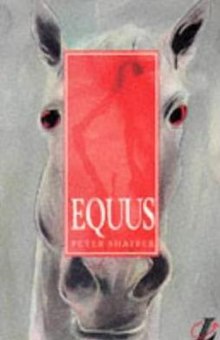| Equus | |
|---|---|
 | |
| Written by | Peter Shaffer |
| Characters |
|
| Date premiered | 1973 |
| Place premiered | Royal National Theatre |
| Original language | English |
| Subject | 17-year-old boy blinds six horses with a spike, case becomes a catalyst for his psychiatrist's own doubts |
| Genre | Drama |
| Setting | The Present; Rokeby Psychiatric Hospital, Southern England |
Equus is a 1973 play by Peter Shaffer, about a child psychiatrist who attempts to treat a young man who has a pathological religious fascination with horses.[1]
Shaffer was inspired to write Equus when he heard of a crime involving a 17-year-old boy who blinded six horses in a small town in northern England.[2][3] He set out to construct a fictional account of what might have caused the incident, without knowing any of the details of the crime, and to evoke the same "air of mystery" and "numinous" qualities as his 1964 play The Royal Hunt of the Sun but in a more modern setting.[2] The narrative of the play follows Dr. Martin Dysart's attempts to understand the cause of the boy's (Alan Strang) actions while wrestling with his own sense of purpose and the nature of his work.[4]
The original stage production ran at the National Theatre in London from 1973 to 1975, directed by John Dexter. Alec McCowen played Dysart, and Peter Firth played Alan Strang. The first Broadway production starred Anthony Hopkins as Dysart (later played by Richard Burton, Leonard Nimoy, and Anthony Perkins) and Peter Firth as Alan. When Firth left for Broadway, Dai Bradley took over the role of Alan in the London production, playing opposite Michael Jayston as Dr. Dysart.[5] Tom Hulce later replaced Firth during the Broadway run. The Broadway production ran for 1,209 performances. Marian Seldes appeared in every single performance of the Broadway run, first in the role of Hesther and then as Dora. Shaffer would later adapt the play for a 1977 film of the same name directed by Sidney Lumet.
The narrative centers on religious and ritual sacrifice themes, as well as the manner in which Strang constructs a personal theology involving the horses and the godhead "Equus". Alan sees the horses as representative of God and confuses his adoration of his "God" with sexual attraction. Also important is Shaffer's examination of the conflict between personal values and satisfaction and societal mores, expectations, and institutions, and between Apollonian and Dionysian values and systems.
- ^ Cite error: The named reference
greatbookswas invoked but never defined (see the help page). - ^ a b "Why are there two u's in 'Equus'?". The New York Times. 13 April 1975. Retrieved 29 January 2024.
a boy was supposed to have blinded 26 horses
- ^ "Backstory: Saddle Up for the Story (Behind the Hype) of Equus". Broadway Buzz. Retrieved 29 January 2024.
- ^ Cite error: The named reference
equustheplaywas invoked but never defined (see the help page). - ^ "Equus Programme" (PDF). Archived (PDF) from the original on 12 April 2016. Retrieved 5 April 2017.